Key takeaways:
- Forgiveness is a process focused on finding personal peace, rather than solely benefiting the wrongdoer.
- Religious teachings on forgiveness emphasize community healing and the importance of compassion, encouraging individuals to embrace vulnerability.
- Sharing personal experiences of forgiveness can strengthen connections and foster empathy among individuals.
- Practicing forgiveness in daily life enhances emotional clarity and promotes a culture of understanding and collaboration.
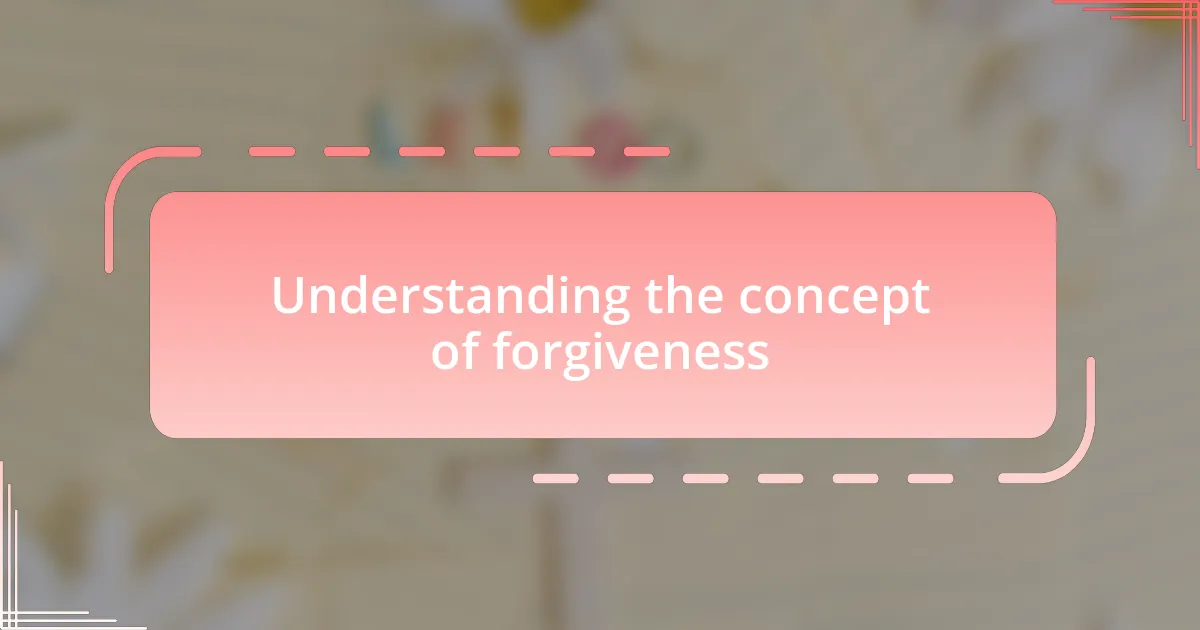
Understanding the concept of forgiveness
Forgiveness can be one of the toughest concepts to grasp, especially when you’ve been hurt deeply. I remember a time when a close friend betrayed my trust, leaving me feeling angry and lost. It prompted me to question: how could I ever forgive someone who caused me so much pain? Through reflection and prayer, I began to understand that forgiveness is less about the other person and more about finding peace within myself.
In my journey, I discovered that forgiveness is not a one-time event; it’s often a process filled with ups and downs. Each time I felt anger resurfacing, I had to consciously choose to let it go, reminding myself that harboring resentment only weighed me down. I realized that it’s okay to feel hurt but acknowledging those feelings can lead to healing. Isn’t that a profound realization—understanding that forgiving can lighten your own emotional burden?
Moreover, I learned that forgiveness is about compassion and empathy. When I tried to see things from my friend’s perspective, it transformed my anger into sorrow for what they might have been going through. Isn’t it interesting how shifting our viewpoint can open doors to understanding? Embracing this idea of compassion made the act of forgiveness feel not just necessary, but also liberating.
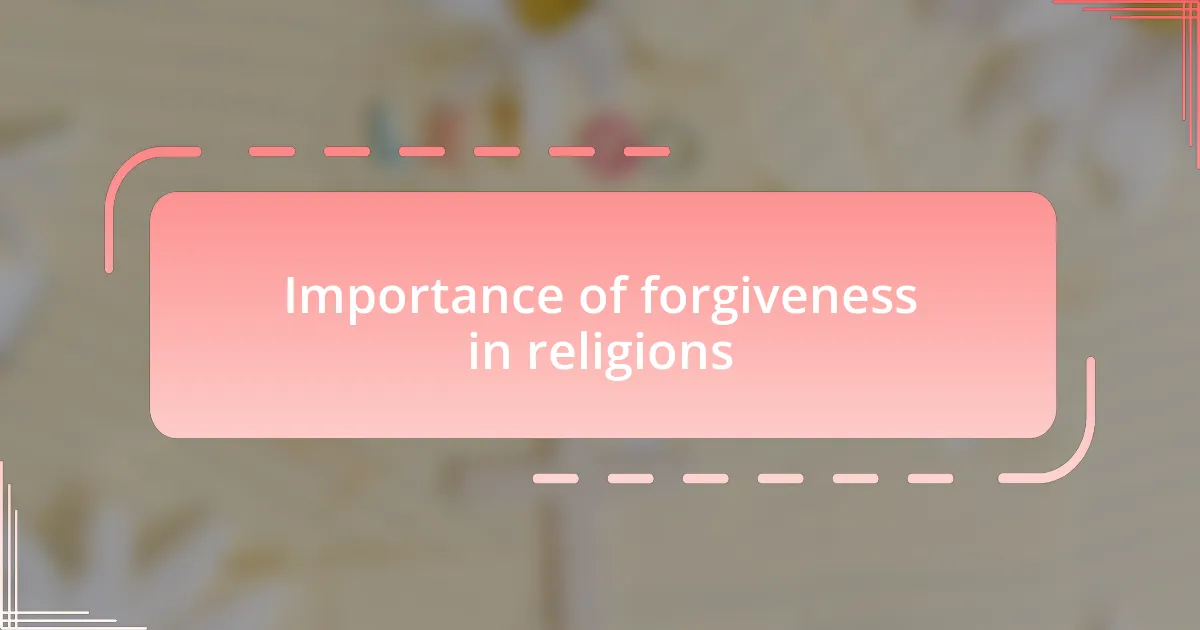
Importance of forgiveness in religions
One of the most profound aspects of forgiveness in religious teachings is its ability to foster community and healing. In many faiths, letting go of grudges is seen as a pathway to unity. I once participated in a church retreat where the focus was on forgiveness, and it amazed me to witness the emotional bonds formed when individuals chose to share their stories of hurt and redemption. How powerful is it to see a community come together, united in their struggles and triumphs over past grievances?
Forgiveness is often positioned as an essential virtue that echoes through scriptural texts, encouraging believers to emulate divine mercy. This isn’t just about moral obligation; it’s a spiritual practice that can lead to inner peace. I recall reading passages that emphasized forgiving “seventy times seven” times, and I couldn’t help but marvel at the depth of this instruction. It suggests that forgiveness requires effort and persistence, showcasing our humanity and our capacity for growth.
Moreover, the transformative power of forgiveness serves as a reminder of our imperfections. I’ve often found solace in the idea that everyone falls short in some way. Reflecting on my own shortcomings, I realized that the act of forgiving others can help me confront my flaws and aspirations for a more compassionate life. Isn’t it fascinating how forgiving another can often lead to a deeper understanding of oneself?
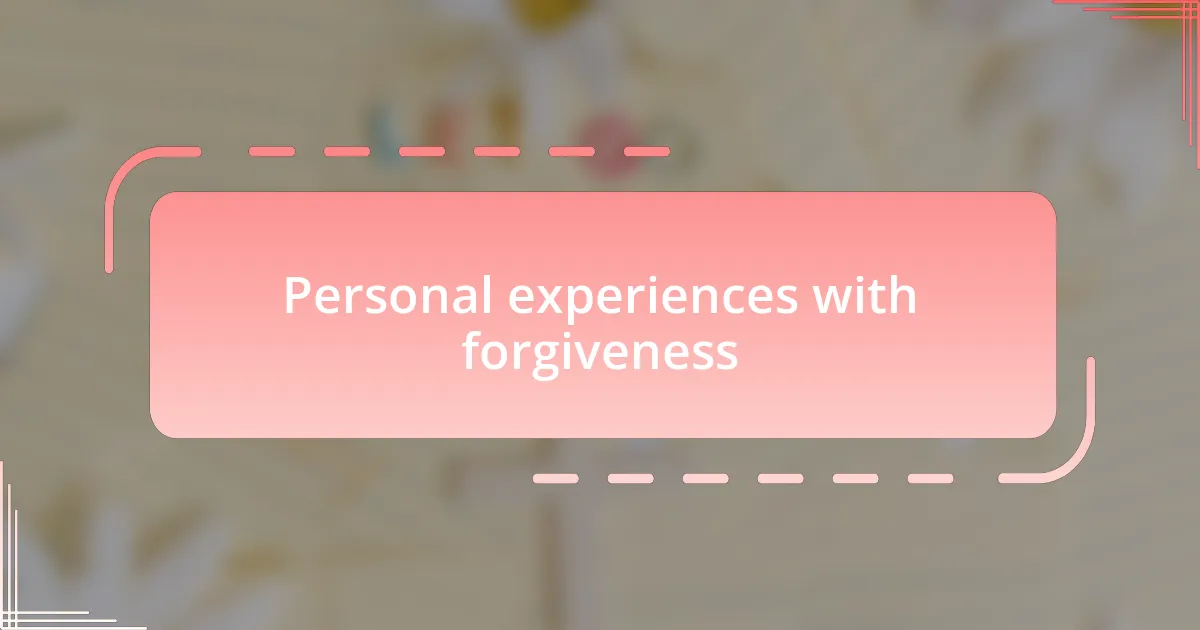
Personal experiences with forgiveness
Forgiveness has shaped my journey in ways I never expected. I remember a specific moment when I had to confront a betrayal by someone close to me. It felt like a weight on my heart, heavy and suffocating. Yet, when I finally chose to forgive, it was liberating. I often pondered—how could letting go of anger transform pain into peace?
In another instance, I found myself in a heated disagreement with a friend that escalated beyond recognition. I thought about our years of friendship and realized that clinging to resentment only created distance. Taking the step to reach out and apologize wasn’t easy, but when I did, the relief we both felt was palpable. Isn’t it curious how vulnerability can mend the deepest wounds?
Most recently, I attended a service where the theme was reconciliation. Listening to others share their stories made me reflect on my own experiences with forgiveness. I realized that when I let go of old grievances, I was not only freeing others but also myself. It made me wonder—what other burdens have I been carrying that could be released through the simple act of forgiveness?
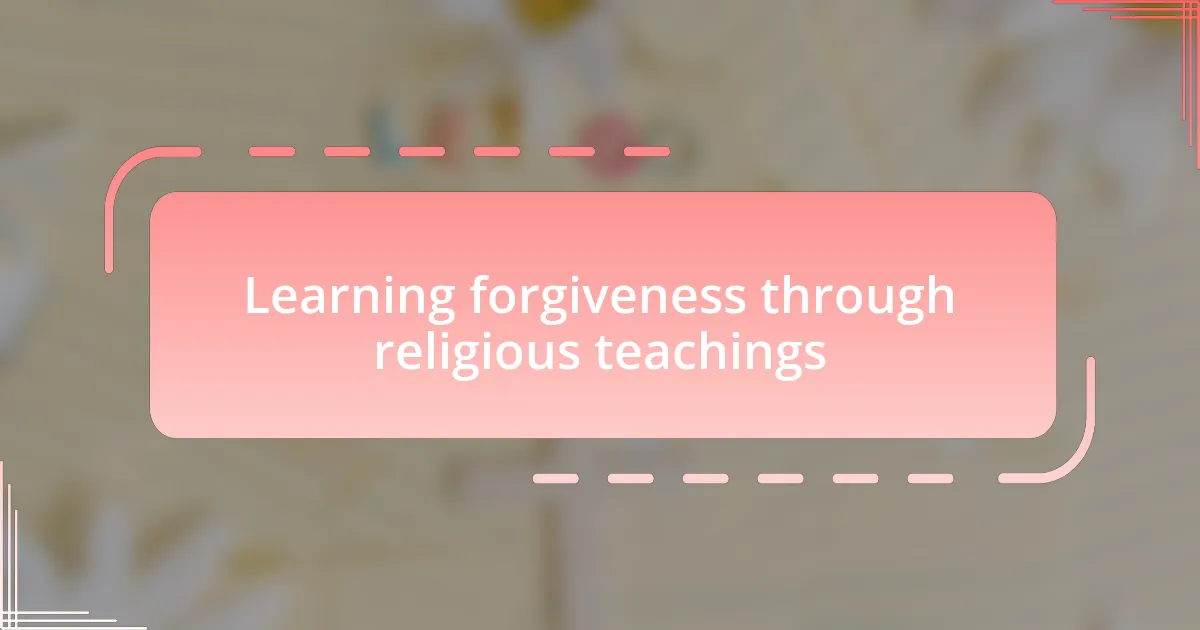
Learning forgiveness through religious teachings
Learning about forgiveness through religious teachings has offered me profound insights that resonate deeply. In my explorations of scripture, I came across the parable of the prodigal son. The unconditional love and forgiveness displayed by the father struck a chord with me. It made me realize that forgiveness isn’t just a duty; it’s a transformative experience that heals both the giver and the receiver.
During one particularly trying sermon, the priest spoke about the act of forgiving others as a reflection of divine grace. I sat there, overwhelmed, recognizing how often I had held onto grudges. I thought about what it meant to truly forgive, not for others, but for my own peace. It was a revelation: holding onto anger was like carrying a backpack full of stones. Wouldn’t it be lighter and brighter to forgive and let go?
In my own community, I’ve engaged in discussions centered around forgiveness and faith. The stories shared were filled with vulnerability, and people often commented on the emotional burden of hatred. One person recounted how their faith helped them reconcile with a family member after a long estrangement. It sparked a realization within me: forgiveness can be an act of courage that not only reconciles relationships but also brings about inner healing. How liberating it feels to choose understanding over resentment!
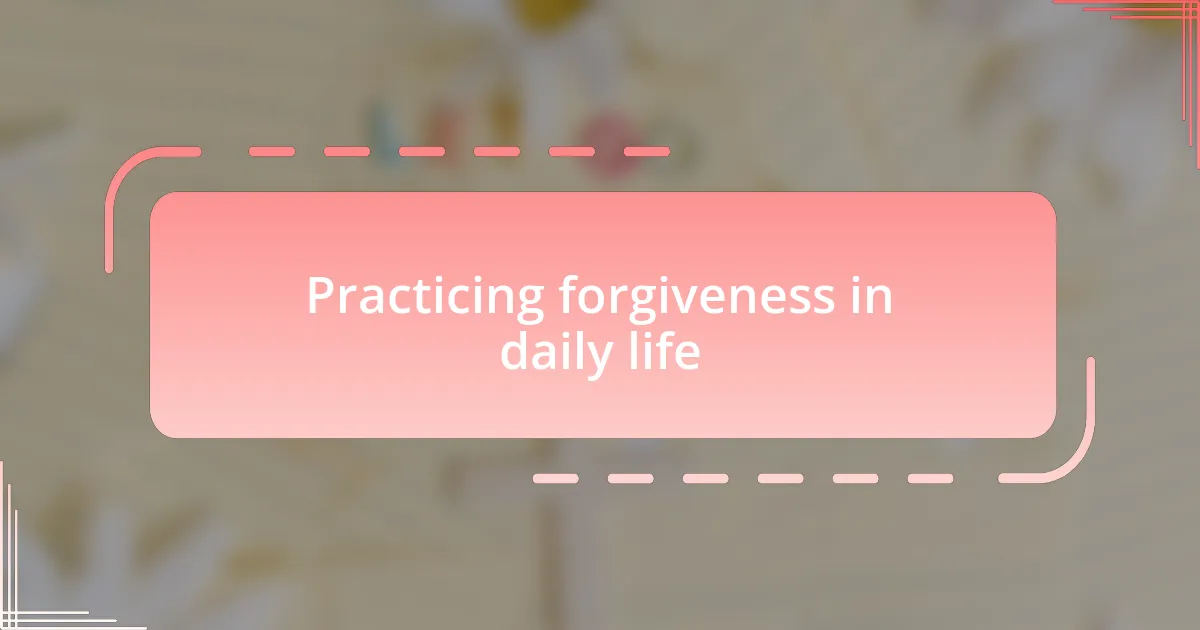
Practicing forgiveness in daily life
In my daily life, I’ve come to see forgiveness as a practice rather than just a one-time event. For instance, one evening, I found myself in a heated disagreement with a close friend. Instead of allowing bitterness to fester, I took a moment to breathe and reflect on our long history together. By choosing to approach the situation with compassion, we both were able to express our feelings openly, which not only resolved the conflict but also deepened our friendship.
Just last week, I encountered a situation at work that tested my resolve to practice forgiveness. A colleague made an unintentional mistake that impacted my project. Initially, I felt the surge of frustration rising within me. However, I paused to remember that everyone is human and prone to errors. After talking with them, I realized how a simple “I understand” could transform our dynamic. Isn’t it fascinating how a small shift in perspective can pave the way for healing and collaboration?
Forgiveness doesn’t always mean that the hurt disappears immediately; often, it takes time and ongoing effort. I recall instances when I’ve had to remind myself to let go of past grudges, even when it’s tempting to cling to them. By reflecting on the lessons from my faith, I’ve learned that each day presents a new opportunity to practice forgiveness, not just for others’ sake, but for my own emotional clarity and peace. Walking this path has taught me that every small act of forgiveness contributes to a larger journey of healing.
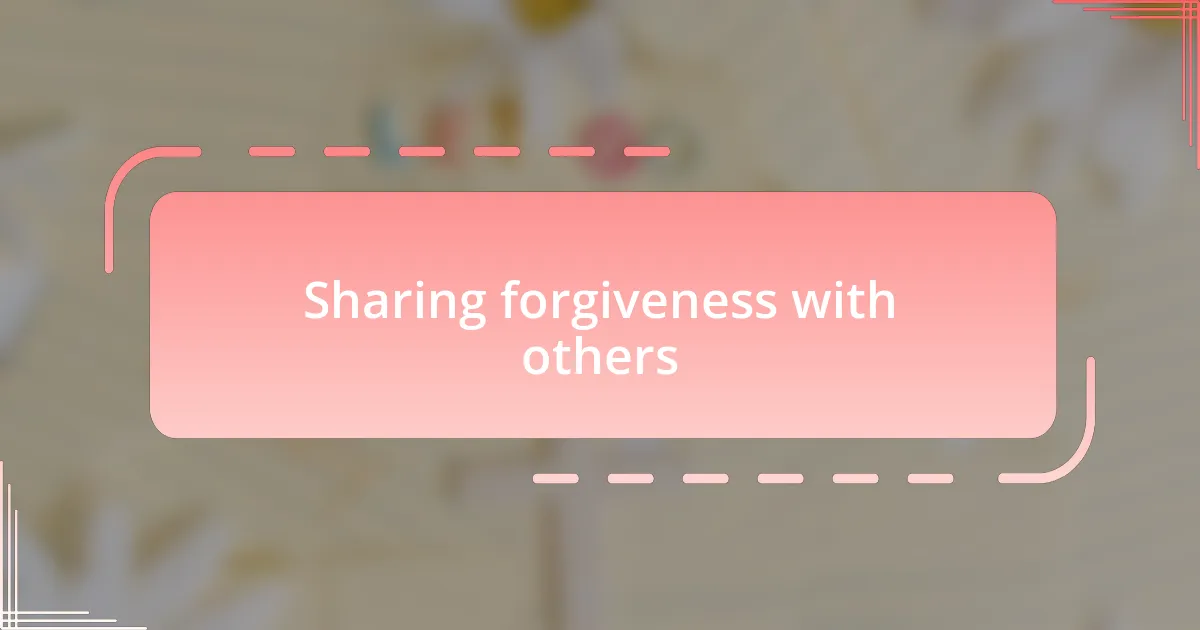
Sharing forgiveness with others
Sharing forgiveness with others has been a transformative experience for me. I remember a time when I hesitated to forgive a family member after a serious misunderstanding that had caused a rift. It was a challenging moment, but I realized that sharing forgiveness was not just about mending the relationship; it was also about freeing myself from the weight of resentment. When I finally reached out to express my willingness to forgive, I felt a tremendous relief wash over me. Have you ever noticed how forgiveness can create a ripple effect? It encourages others to open up and share their own stories of grace.
In another instance, I found myself participating in a community group dedicated to rebuilding trust among its members. One day, during a group discussion, someone bravely shared their struggle with forgiveness after facing betrayal. Inspired, I decided to share my experience. As I spoke, I could feel the tension in the room dissipate. This interaction reminded me that sharing our stories of forgiveness not only fosters connection but allows us to recognize our shared humanity. Isn’t it remarkable how sharing such personal experiences can strengthen bonds and cultivate empathy among individuals?
Moreover, I’ve learned that true forgiveness often requires vulnerability. I recall a moment when I had to confront a colleague who hurt my feelings during a team project. Instead of deflecting or hiding my hurt, I chose to communicate my feelings openly. When I expressed my need for forgiveness—and offered it in return—we were able to start anew with a shared understanding. This exchange deepened our professional relationship and created an environment where forgiveness became part of our team culture. Isn’t it powerful when we share our struggles and triumphs in forgiveness to inspire one another?